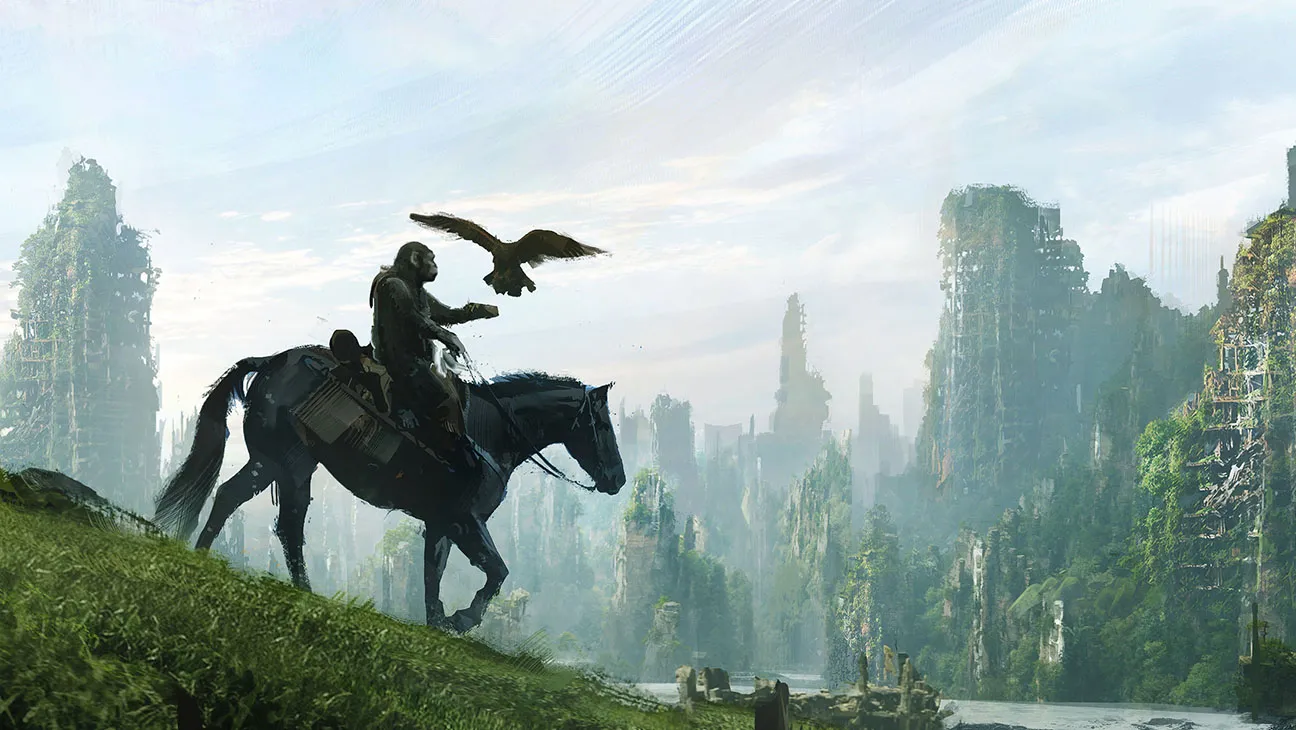
Film Review: Kingdom of the Planet of the Apes
Film Reviews
Kingdom of the Planet of the Apes
Director: Wes Ball
Oddball Entertainment
In Theaters: 05.10
It’s been a while since I’ve gone into a franchise film with as much anticipation—or as much trepidation—as Kingdom of the Planet of the Apes. The Rise, Dawn and War trilogy ranks among my all-time favorites; they set such a high bar that it could be very exciting to see anyone reach for it (and equally painful to watch them fall short).
Kingdom of the Planet of the Apes takes place 300 years after the events of War for the Planet of the Apes. The apes are now the dominant species while humans have regressed to a wild and primal state. A young chimpanzee named Noa (Owen Teague, Montana Story, You Hurt My Feelings) lives with his clan until they are attacked by marauders in the dead of night, burning his village, taking captives and repeating the phrase “For Caesar.” Noa sets off in search of his clan and meets an orangutan named Raka (Peter Macon, The Orville), who tells Noa that there was once a time when apes and humans coexisted, and that Caesar was a great leader, though his teachings have been been perverted by some apes who seek power. Noa and Raka come across a young human woman, whom Raka dubs “Nova” (Freya Allan, The Witcher, Gunpowder Milkshake) after a human from the history of Caesar. Together, they find a civilization ruled by an ambitious and unscrupulous Bonobo known as Proximus Caesar (Kevin Durand, Robin Hood, X-Men Origins: Wolverine), who seeks to use weapons crafted from forgotten human advancements to build an empire on the backs of other apes. Noa and his mysterious human companion may be all that stands in his way.
Kingdom of the Planet of the Apes is an entertaining science fiction adventure that is best enjoyed by judging it for what it is rather than focusing too heavily on the lofty standard of its immediate predecessors. There are number of reasons why it’s lacking the depth of that trilogy, and one of the biggest actually comes from having too much freedom. The limited speech capabilities of the apes in the previous films required a painstaking approach to character development, both in terms of individual look and in the acting, and the result was some of the richest and most memorable characterizations in any mainstream films of the 21st century, particularly in the two helmed by Matt Reeves. In Kingdom, the ability to express everything in spoken word gives screenwriter Josh Friedman (Avatar: The Way of Water) and director Wes Ball (The Maze Runner) a bit too much license to relax and take a less intricate, even somewhat dumbed-down approach to the characters and storytelling. The script often feels underrealized, and the dialogue tends to feel a bit on the nose. Nova is more of a plot device than a three-dimensional character, and some of the revelations about her true nature take the story in directions that feel problematic—if the endgame is to get us to the point in time where the original 1968 film takes place.
The cinematography by Gyula Pados (Shazam! Fury of the Gods) is a bit flat, lacking the remarkable texture, shading and atmospheric touches of Michael Seresin’s brilliant work on the last two films, and the majority of the action taking place under bright sunlight doesn’t always compliment the visual effects as strongly as the dark, overcast look that Reeves and Seresin favored (in particular, the eagles that follow Noa looked distractingly fake to me). All of that being said, the movie has plenty of strengths: there are some solid and exciting action sequences, and the themes of religious doctrine being diluted or even reinterpreted to serve an agenda—as well as a societal structure that justifies subjugation and oppression “for the greater good”—are intriguing. When the film finds its mojo, it’s a highly enjoyable summer movie.
While the characters are comparatively lacking, there are some strong performances, and Teague does a very capable job as Noa, a youthful “everychimp” thrust into the situation of having to be a hero. Macon is the clear standout as Raka (the orangutan is always the best part of these films), a wise and bighearted fellow. Durand makes Proximus Caesar a commanding if not particularly layered villain, but the human characters are all far too forgettable, with William H. Macy (Fargo, Jurassic Park III) barely even registering as Trevathan, a human living inside Proximus Caesar’s clan.
While it’s neither as smart nor as soulful as the most recent stellar entries in the series, Kingdom of the Planet of the Apes captures the feel of the ‘70s film; judged on that level, it’s one of the stronger films within the larger franchise. As the first chapter in a new part of the overall story, it’s a promising beginning, though if it’s going to continue, I will need to see some some significant evolution in the quality of writing for the next installment. –Patrick Gibbs
Read More Fantastical Franchise Reviews:
Ghostbusters: Frozen Empire
Dune: Part Two